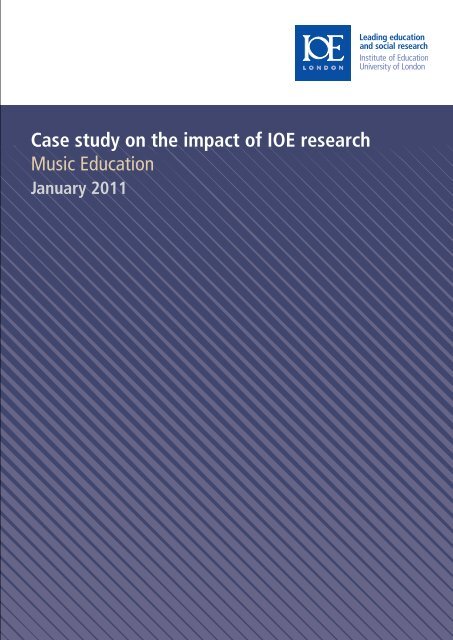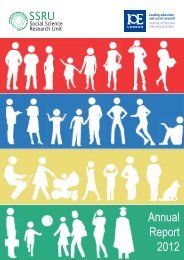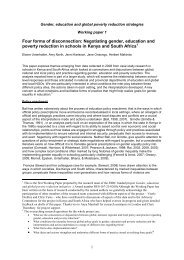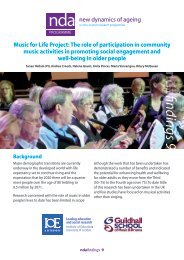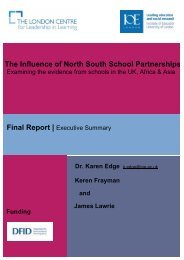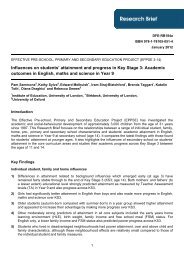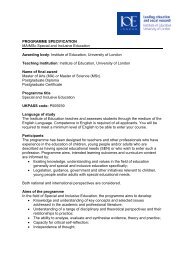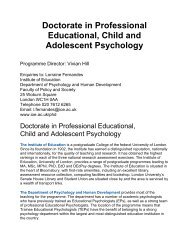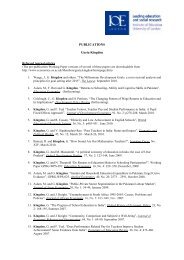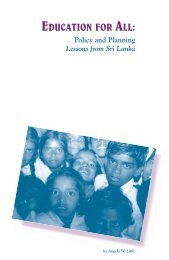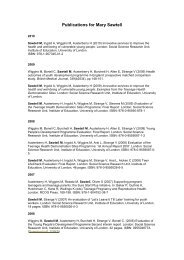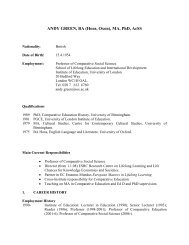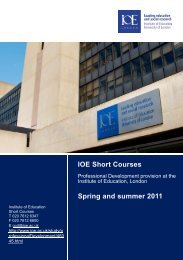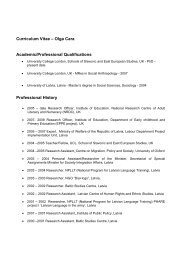Case study on the impact of IOE research Music Education
Case study on the impact of IOE research Music Education
Case study on the impact of IOE research Music Education
Create successful ePaper yourself
Turn your PDF publications into a flip-book with our unique Google optimized e-Paper software.
<str<strong>on</strong>g>Case</str<strong>on</strong>g> <str<strong>on</strong>g>study</str<strong>on</strong>g> <strong>on</strong> <strong>the</strong> <strong>impact</strong> <strong>of</strong> <strong>IOE</strong> <strong>research</strong><br />
<strong>Music</strong> Educati<strong>on</strong><br />
January 2011
<str<strong>on</strong>g>Case</str<strong>on</strong>g> <str<strong>on</strong>g>study</str<strong>on</strong>g> <strong>on</strong> <strong>the</strong> <strong>impact</strong> <strong>of</strong> <strong>IOE</strong> <strong>research</strong><br />
<strong>Music</strong> Educati<strong>on</strong><br />
“Evidence suggests that learning an<br />
instrument can improve numeracy,<br />
literacy and behaviour. But more than<br />
that, it is simply unfair that <strong>the</strong> joy <strong>of</strong><br />
musical discovery should be <strong>the</strong> preserve<br />
<strong>of</strong> those whose parents can afford it.”<br />
Michael Gove, Educati<strong>on</strong> Secretary,<br />
speaking at <strong>the</strong> launch <strong>of</strong> <strong>the</strong> Henley<br />
Review <strong>of</strong> <strong>Music</strong> Educati<strong>on</strong>, September<br />
24, 2010.<br />
Who carries out music <strong>research</strong> at<br />
<strong>the</strong> <strong>IOE</strong>?<br />
The Institute <strong>of</strong> Educati<strong>on</strong> has almost 20<br />
music educati<strong>on</strong> specialists – <strong>the</strong> largest<br />
group <strong>of</strong> music educati<strong>on</strong> <strong>research</strong>ers<br />
working in <strong>the</strong> same instituti<strong>on</strong> in <strong>the</strong><br />
UK. They are all associated with <strong>the</strong> <strong>IOE</strong>’s<br />
Internati<strong>on</strong>al <strong>Music</strong> Educati<strong>on</strong> Research<br />
Centre: (http://imerc.org), which was<br />
established in 2005.<br />
Who provides <strong>the</strong> funding?<br />
The iMerc <strong>research</strong>ers have attracted<br />
funding from major UK <strong>research</strong><br />
councils, <strong>the</strong> European Community,<br />
government departments, local<br />
authorities, leading charities such as <strong>the</strong><br />
Paul Hamlyn and <strong>the</strong> Esmée Fairbairn<br />
foundati<strong>on</strong>s, and o<strong>the</strong>r charitable<br />
bodies that promote music.<br />
Introducti<strong>on</strong><br />
Researchers at <strong>the</strong> Institute <strong>of</strong> Educati<strong>on</strong><br />
have had a very substantial effect <strong>on</strong><br />
what is taught in <strong>the</strong> music classroom<br />
– and how it is taught. Like o<strong>the</strong>r<br />
<strong>research</strong>ers, <strong>the</strong>y <strong>on</strong>ly occasi<strong>on</strong>ally<br />
exert direct influence over <strong>the</strong> policymakers<br />
who shape <strong>the</strong> music educati<strong>on</strong><br />
curriculum. Most music educati<strong>on</strong><br />
studies are not produced for a policy<br />
audience. Even so, music <strong>research</strong> can<br />
help decisi<strong>on</strong>-makers to evaluate <strong>the</strong><br />
range <strong>of</strong> choices before <strong>the</strong>m. It can<br />
also, crucially, help to create, bolster or<br />
challenge <strong>the</strong> assumpti<strong>on</strong>s that underlie<br />
nati<strong>on</strong>al and local policy decisi<strong>on</strong>s.<br />
A recent example is <strong>of</strong>fered by <strong>the</strong><br />
important independent review <strong>of</strong> music<br />
educati<strong>on</strong> in England that <strong>the</strong> coaliti<strong>on</strong><br />
government launched in September<br />
2010. Educati<strong>on</strong> Secretary Michael<br />
Gove told <strong>the</strong> review chairman, Darren<br />
Henley, managing director <strong>of</strong> Classic<br />
FM, that he should make several key<br />
assumpti<strong>on</strong>s as he set out to ga<strong>the</strong>r<br />
evidence. One was that <strong>the</strong> “sec<strong>on</strong>dary<br />
benefits <strong>of</strong> a quality music educati<strong>on</strong><br />
are those <strong>of</strong> increased self-esteem<br />
and aspirati<strong>on</strong>s; improved behaviour<br />
and social skills; and improved<br />
academic attainment in areas such<br />
as numeracy, literacy and language. 1<br />
There is evidence that music and<br />
cultural activity can fur<strong>the</strong>r not <strong>on</strong>ly <strong>the</strong><br />
educati<strong>on</strong> and cultural agendas but also<br />
<strong>the</strong> aspirati<strong>on</strong>s for <strong>the</strong> Big Society”.<br />
The <strong>IOE</strong>’s music <strong>research</strong><br />
has d<strong>on</strong>e much to publicise<br />
<strong>the</strong> physical, psychological<br />
and cognitive benefits <strong>of</strong><br />
singing or learning to play<br />
an instrument.<br />
O<strong>the</strong>r <strong>research</strong> led by<br />
Pr<strong>of</strong>essor Lucy Green<br />
has helped to popularise<br />
informal approaches to<br />
music educati<strong>on</strong> that are<br />
similar to <strong>the</strong> ways in which<br />
rock musicians learn <strong>the</strong>ir<br />
craft.<br />
1<br />
Where did <strong>the</strong> evidence supporting this<br />
assumpti<strong>on</strong> come from? Much <strong>of</strong> it was,<br />
in fact, derived from empirical studies<br />
in <strong>the</strong> UK and Italy under <strong>the</strong> leadership<br />
<strong>of</strong> Pr<strong>of</strong>essor Graham Welch, chair <strong>of</strong>
<strong>Music</strong> Educati<strong>on</strong><br />
music educati<strong>on</strong> at <strong>the</strong> <strong>IOE</strong>, and from a<br />
major review <strong>of</strong> music <strong>research</strong> that was<br />
compiled by his colleague, Pr<strong>of</strong>essor<br />
Sue Hallam. The <strong>the</strong>n Department for<br />
Children, Schools and Families (DCSF)<br />
commissi<strong>on</strong>ed Pr<strong>of</strong>essor Hallam’s review<br />
to mark <strong>the</strong> start <strong>of</strong> Tune In – Year <strong>of</strong><br />
<strong>Music</strong>, which began in September<br />
2009. Her paper, The power <strong>of</strong> music:<br />
its <strong>impact</strong> <strong>on</strong> <strong>the</strong> intellectual, social and<br />
pers<strong>on</strong>al development <strong>of</strong> children and<br />
young people (http://www.ioe.ac.uk/<br />
Year_<strong>of</strong>_<strong>Music</strong>.pdf) documents <strong>the</strong><br />
effects that a child’s active engagement<br />
in music can have <strong>on</strong> <strong>the</strong>ir:<br />
• perceptual, language and<br />
literacy skills<br />
• numeracy<br />
• intellectual development<br />
• general attainment and<br />
creativity<br />
• pers<strong>on</strong>al and social<br />
development, and<br />
• physical development, health<br />
and well-being.<br />
The paper followed an earlier <strong>research</strong><br />
review for parents and teachers <strong>on</strong><br />
<strong>the</strong> importance <strong>of</strong> music by Pr<strong>of</strong>essor<br />
Welch and Pauline Adams that had<br />
been commissi<strong>on</strong>ed by <strong>the</strong> British<br />
Educati<strong>on</strong>al Research Associati<strong>on</strong><br />
(BERA) with support from <strong>the</strong> UK<br />
Government. This review was launched<br />
at <strong>the</strong> House <strong>of</strong> Comm<strong>on</strong>s in October<br />
2003. 2<br />
Key <strong>the</strong>mes <strong>of</strong> <strong>the</strong> Institute’s<br />
music <strong>research</strong><br />
The <strong>IOE</strong>’s own music <strong>research</strong> has also<br />
d<strong>on</strong>e much to publicise <strong>the</strong> physical,<br />
psychological and cognitive benefits<br />
<strong>of</strong> singing or learning to play an<br />
instrument. It has emphasised <strong>the</strong> value<br />
<strong>of</strong> music in its own right too.<br />
Ano<strong>the</strong>r very important strand <strong>of</strong> <strong>IOE</strong><br />
<strong>research</strong>, led by Pr<strong>of</strong>essor Lucy Green,<br />
has helped to popularise informal<br />
approaches to music educati<strong>on</strong> that<br />
are similar to <strong>the</strong> ways in which rock<br />
musicians learn <strong>the</strong>ir craft. Her work<br />
challenges traditi<strong>on</strong>al views <strong>of</strong> music<br />
teaching and learning 3 and is having a<br />
huge <strong>impact</strong> <strong>on</strong> classroom practice, as<br />
will be explained later in this case <str<strong>on</strong>g>study</str<strong>on</strong>g>.<br />
A key message from several <strong>IOE</strong> studies<br />
is that musical development is possible<br />
for every<strong>on</strong>e, not just a ‘talented’<br />
minority. 4 “For example, it is not a case<br />
<strong>of</strong> ‘can sing/can’t sing’. It’s a c<strong>on</strong>tinuum,”<br />
says Pr<strong>of</strong>essor Welch. “Everybody can<br />
sing. The term ‘t<strong>on</strong>e deaf’ should be<br />
c<strong>on</strong>fined to <strong>the</strong> very small number<br />
<strong>of</strong> people who have some form <strong>of</strong><br />
neurological disorder in <strong>the</strong> processing<br />
<strong>of</strong> sound.”<br />
<strong>Music</strong> <strong>research</strong> at <strong>the</strong> <strong>IOE</strong> has also<br />
served to debunk some myths that<br />
have gained credence in recent years,<br />
such as <strong>the</strong> suggesti<strong>on</strong> that listening to<br />
Mozart improves children’s cognitive<br />
performance. In fact, some pop s<strong>on</strong>gs<br />
can have a more beneficial effect <strong>on</strong><br />
pupils’ schoolwork, as Pr<strong>of</strong>essor Hallam<br />
has pointed out. 5<br />
Her <strong>research</strong> into children’s choice<br />
<strong>of</strong> musical instruments has raised<br />
questi<strong>on</strong>s about gender stereotyping<br />
too 6 . It c<strong>on</strong>firmed that girls tend to<br />
play <strong>the</strong> harp, flute, piccolo, clarinet,<br />
oboe and violin while boys are far more<br />
likely to choose <strong>the</strong> electric guitar, bass<br />
guitar, tuba and tromb<strong>on</strong>e 7 . Singlesex<br />
ensembles could help to bridge<br />
<strong>the</strong> divide, Pr<strong>of</strong>essor Hallam and her<br />
colleagues c<strong>on</strong>cluded.<br />
Am<strong>on</strong>g <strong>the</strong> o<strong>the</strong>r topics being<br />
investigated by <strong>the</strong> <strong>IOE</strong>’s music<br />
<strong>research</strong>ers are:<br />
• <strong>the</strong> place and use <strong>of</strong> music<br />
technology in music educati<strong>on</strong><br />
• <strong>the</strong> pr<strong>of</strong>essi<strong>on</strong>al development <strong>of</strong><br />
musicians<br />
• music teacher educati<strong>on</strong><br />
• motivati<strong>on</strong> and self-percepti<strong>on</strong>s <strong>of</strong><br />
c<strong>on</strong>servatoire students, and<br />
• effective choral educati<strong>on</strong> and<br />
choral leadership.<br />
2
<str<strong>on</strong>g>Case</str<strong>on</strong>g> <str<strong>on</strong>g>study</str<strong>on</strong>g> <strong>on</strong> <strong>the</strong> <strong>impact</strong> <strong>of</strong> <strong>IOE</strong> <strong>research</strong><br />
Major <strong>IOE</strong> music <strong>research</strong><br />
projects<br />
The projects under way include:<br />
Sing Up<br />
The Government’s £40 milli<strong>on</strong> fouryear<br />
(2007–11) singing programme for<br />
primary schools in England is being<br />
evaluated by Pr<strong>of</strong>essor Welch, Dr<br />
Evangelos Him<strong>on</strong>ides, Dr Jo Saunders<br />
and Dr Ioulia Papageorgi. 8 Sing Up<br />
aims to ensure that primary children<br />
experience high-quality singing <strong>on</strong> a<br />
daily basis.<br />
The <strong>IOE</strong> team undertook a baseline<br />
audit <strong>of</strong> singing in randomly selected<br />
schools and has used this data to<br />
measure <strong>the</strong> programme’s <strong>impact</strong>.<br />
Over <strong>the</strong> first three years <strong>of</strong> Sing<br />
Up, this evaluati<strong>on</strong> project took <strong>the</strong><br />
<strong>research</strong>ers to 177 English schools. They<br />
have assessed <strong>the</strong> individual singing<br />
development <strong>of</strong> nearly 10,000 pupils,<br />
mainly aged 7 to 10, and have noted<br />
children’s attitudes to singing, in and<br />
out <strong>of</strong> school.<br />
They found that children who have<br />
taken part in Sing Up are, <strong>on</strong> average,<br />
two years ahead in <strong>the</strong>ir singing<br />
development, compared to those not<br />
involved in <strong>the</strong> programme. The Sing Up<br />
evaluati<strong>on</strong> has also c<strong>on</strong>firmed that older<br />
children – including boys – can develop<br />
much more positive attitudes to singing<br />
if <strong>the</strong>y:<br />
• have expert role models,<br />
whe<strong>the</strong>r adult or child, such<br />
as those provided in <strong>the</strong><br />
Singing Playgrounds (http://<br />
www.exca<strong>the</strong>dra.co.uk/) and<br />
Chorister Outreach programmes<br />
(http://www.choirschools.org.<br />
uk/2csahtml/outreach.htm), and<br />
• experience a rich musical<br />
repertoire, including singing<br />
games and opportunities<br />
for performance, which is<br />
interwoven into <strong>the</strong> school’s<br />
educati<strong>on</strong>al culture.<br />
The <strong>IOE</strong> evaluati<strong>on</strong> has found that<br />
better singers tend to have a more<br />
positive view <strong>of</strong> <strong>the</strong>mselves and a<br />
str<strong>on</strong>ger sense <strong>of</strong> social inclusi<strong>on</strong>, a<br />
<strong>IOE</strong> <strong>research</strong>ers found that<br />
children taking part in <strong>the</strong><br />
Government programme<br />
Sing Up are, <strong>on</strong> average, two<br />
years ahead in <strong>the</strong>ir singing<br />
development.<br />
3
<strong>Music</strong> Educati<strong>on</strong><br />
finding that is supported by <strong>research</strong><br />
c<strong>on</strong>ducted for <strong>the</strong> Italian government. 9<br />
Resp<strong>on</strong>ses from more than 1,000<br />
teachers and community musicians<br />
involved in Sing Up suggest that <strong>the</strong>ir<br />
c<strong>on</strong>fidence in <strong>the</strong>ir own singing and<br />
teaching has also improved as a direct<br />
result <strong>of</strong> <strong>the</strong> pr<strong>of</strong>essi<strong>on</strong>al development<br />
<strong>of</strong>fered by <strong>the</strong> programme.<br />
<strong>Music</strong>al Futures<br />
The ‘Informal learning in <strong>the</strong> music<br />
classroom’ <str<strong>on</strong>g>study</str<strong>on</strong>g> that a team led by<br />
Pr<strong>of</strong>essor Lucy Green undertook in<br />
partnership with Hertfordshire County<br />
Council is also making a very important<br />
c<strong>on</strong>tributi<strong>on</strong> to music educati<strong>on</strong>. This<br />
pathfinder project formed part <strong>of</strong> <strong>the</strong><br />
successful <strong>Music</strong>al Futures initiative<br />
funded by <strong>the</strong> Paul Hamlyn Foundati<strong>on</strong><br />
and <strong>the</strong> DCSF (now <strong>the</strong> Department for<br />
Educati<strong>on</strong>). 10<br />
Pr<strong>of</strong>essor Green developed and<br />
evaluated radical new teaching and<br />
learning strategies for 11 to 14-yearolds<br />
that were drawn from <strong>the</strong> informal<br />
learning practices <strong>of</strong> popular musicians.<br />
Whilst popular music has been a part<br />
<strong>of</strong> curriculum c<strong>on</strong>tent for over 30<br />
years, classroom pedagogy c<strong>on</strong>tinued<br />
to use models that were suited for<br />
classical music. By basing itself <strong>on</strong> <strong>the</strong><br />
very different ways in which popular<br />
musicians learn, Lucy Green’s work has<br />
brought a refreshingly new method <strong>of</strong><br />
teaching into <strong>the</strong> classroom.<br />
Pupils taking part in <strong>the</strong> Hertfordshire<br />
<str<strong>on</strong>g>study</str<strong>on</strong>g> directed <strong>the</strong>ir own learning in<br />
small friendship groups, selecting <strong>the</strong>ir<br />
music and attempting to play it by ear<br />
from <strong>the</strong> recording. Teachers initially<br />
stood back and observed, <strong>the</strong>n acted<br />
as guides and musical models ra<strong>the</strong>r<br />
than instructors. Pupils later composed<br />
music, performed in bands with<br />
community musicians, and applied <strong>the</strong><br />
learning strategies <strong>the</strong>y had acquired<br />
to classical music, again, under <strong>the</strong><br />
guidance <strong>of</strong> <strong>the</strong>ir teachers.<br />
The five-year <strong>research</strong>-anddevelopment<br />
phase <strong>of</strong> <strong>the</strong> work ended<br />
in 2007, but <strong>the</strong> implementati<strong>on</strong> <strong>of</strong> <strong>the</strong><br />
strategies within classrooms is growing<br />
all <strong>the</strong> time. More than 1,000 schools<br />
are adopting <strong>the</strong> informal learning<br />
model (see <strong>the</strong> Impact secti<strong>on</strong> <strong>of</strong> this<br />
case <str<strong>on</strong>g>study</str<strong>on</strong>g>).<br />
<strong>Music</strong>al Futures is being evaluated by<br />
ano<strong>the</strong>r team <strong>of</strong> <strong>IOE</strong> <strong>research</strong>ers led by<br />
Pr<strong>of</strong>essor Hallam and Dr Andrea Creech.<br />
An evaluati<strong>on</strong> <strong>the</strong>y carried out in 2008<br />
established how many schools had<br />
taken up <strong>Music</strong>al Futures and what <strong>the</strong>y<br />
were doing. Their sec<strong>on</strong>d evaluati<strong>on</strong>,<br />
which will c<strong>on</strong>tinue until 2011, is a<br />
l<strong>on</strong>gitudinal investigati<strong>on</strong> <strong>of</strong> how <strong>the</strong><br />
project is evolving in six schools.<br />
Sounds <strong>of</strong> Intent<br />
Graham Welch is leading <strong>the</strong> Sounds <strong>of</strong><br />
Intent programme with Pr<strong>of</strong>essor Adam<br />
Ockelford, a Visiting Research Fellow<br />
and Pr<strong>of</strong>essor <strong>of</strong> <strong>Music</strong> at Roehampt<strong>on</strong><br />
University. This programme is<br />
investigating and promoting <strong>the</strong><br />
musical development <strong>of</strong> children and<br />
young people with severe, or pr<strong>of</strong>ound<br />
and multiple learning difficulties (until<br />
relatively recently, <strong>on</strong>ly 5 per cent <strong>of</strong> this<br />
group were receiving music <strong>the</strong>rapy).<br />
The <strong>research</strong>ers have devised a new<br />
way <strong>of</strong> mapping musical development<br />
for such children 11 and <strong>the</strong>ir methods<br />
have been made available to <strong>the</strong><br />
whole special educati<strong>on</strong> sector in <strong>the</strong><br />
UK and internati<strong>on</strong>ally through a new<br />
dedicated website, designed by Dr<br />
Evangelos Him<strong>on</strong>ides.<br />
This project was set up in 2002 by <strong>the</strong><br />
<strong>IOE</strong> in collaborati<strong>on</strong> with <strong>the</strong> Royal<br />
Nati<strong>on</strong>al Institute <strong>of</strong> Blind People (RNIB),<br />
building <strong>on</strong> an earlier nati<strong>on</strong>al survey.<br />
The latest 15-m<strong>on</strong>th extensi<strong>on</strong> to <strong>the</strong><br />
programme is being funded by <strong>the</strong><br />
Esmée Fairbairn Foundati<strong>on</strong>. The project<br />
team includes Sally-Anne Zimmermann<br />
from RNIB and Dr Angela Vogiatzoglou<br />
(Roehampt<strong>on</strong>).<br />
New Dynamics <strong>of</strong> Ageing (NDA) music<br />
project<br />
This music project is part <strong>of</strong> <strong>the</strong><br />
largest and most ambitious <strong>research</strong><br />
programme <strong>on</strong> ageing ever mounted in<br />
4
<str<strong>on</strong>g>Case</str<strong>on</strong>g> <str<strong>on</strong>g>study</str<strong>on</strong>g> <strong>on</strong> <strong>the</strong> <strong>impact</strong> <strong>of</strong> <strong>IOE</strong> <strong>research</strong><br />
this country. The programme is a unique<br />
collaborati<strong>on</strong> between five UK <strong>research</strong><br />
councils. 12 The NDA music project being<br />
led by <strong>research</strong>ers at <strong>the</strong> Institute <strong>of</strong><br />
Educati<strong>on</strong> is examining whe<strong>the</strong>r older<br />
people’s participati<strong>on</strong> in music-making,<br />
particularly in community settings,<br />
can improve <strong>the</strong>ir well-being. It is<br />
also trying to establish whe<strong>the</strong>r <strong>the</strong>re<br />
are spin-<strong>of</strong>f benefits for families and<br />
residential communities when older<br />
people become actively involved in<br />
making music.<br />
The <str<strong>on</strong>g>study</str<strong>on</strong>g> is being carried out by four<br />
<strong>IOE</strong> <strong>research</strong>ers – Sue Hallam, Andrea<br />
Creech, Maria Varvarigou and Hilary<br />
McQueen – and involves three-case<str<strong>on</strong>g>study</str<strong>on</strong>g><br />
sites:<br />
• The Sage Gateshead, where<br />
more than 500 people take part<br />
in weekly music activities such<br />
as singing, African drumming,<br />
and playing guitars, recorders,<br />
steel pans and ukuleles.<br />
• The Guildhall C<strong>on</strong>nect Project,<br />
which runs community music<br />
projects in East L<strong>on</strong>d<strong>on</strong> with<br />
people from a wide range<br />
<strong>of</strong> backgrounds, ages and<br />
experiences. It <strong>of</strong>fers everything<br />
from classical to popular music,<br />
western and n<strong>on</strong>-western<br />
genres.<br />
• The <strong>Music</strong> Department <strong>of</strong> <strong>the</strong><br />
Westminster Adult Educati<strong>on</strong><br />
Services, which provides<br />
community music activities<br />
for older people. Courses are<br />
<strong>of</strong>fered in not <strong>on</strong>ly singing and<br />
playing instruments, but sound<br />
engineering and composing.<br />
Interviews, focus groups and<br />
observati<strong>on</strong>s have been carried out at<br />
each case-<str<strong>on</strong>g>study</str<strong>on</strong>g> site. Questi<strong>on</strong>naires<br />
have also been completed by 350<br />
older people participating in musical<br />
activities and by a c<strong>on</strong>trol group <strong>of</strong> just<br />
over 100 people who are taking part<br />
in n<strong>on</strong>-musical activities. Most <strong>of</strong> <strong>the</strong><br />
participants are aged between 60 and<br />
80. Preliminary findings suggest that<br />
levels <strong>of</strong> well-being are higher am<strong>on</strong>gst<br />
<strong>the</strong> music participants than am<strong>on</strong>gst<br />
<strong>the</strong> c<strong>on</strong>trol group.<br />
Usability <strong>of</strong> <strong>Music</strong> for <strong>the</strong> Social<br />
Inclusi<strong>on</strong> <strong>of</strong> Children (UMSIC)<br />
The UMSIC project (2008–2011) is<br />
supporting children’s social inclusi<strong>on</strong><br />
through music. It is doing this by<br />
developing a hand-held JamMo<br />
(jamming mobile) which encourages<br />
children to communicate musically<br />
using mobile ph<strong>on</strong>es. The JamMo<br />
enables <strong>the</strong>m to compose s<strong>on</strong>gs, <strong>the</strong>n<br />
create new versi<strong>on</strong>s <strong>of</strong> <strong>the</strong> s<strong>on</strong>g using<br />
virtual instruments. As it has a karaoke<br />
functi<strong>on</strong>, a child can also listen to a<br />
s<strong>on</strong>g, sing al<strong>on</strong>g, save <strong>the</strong> result and<br />
share it with a teacher, friend or relative.<br />
The project, which also aims to<br />
foster children’s creative musical<br />
development, is targeted at both<br />
pre-school youngsters (3–5 years) and<br />
primary school pupils (6–12 years).<br />
Whilst intended to be suitable for<br />
all children, <strong>the</strong> JamMo is primarily<br />
designed to help two groups at high<br />
risk <strong>of</strong> marginalisati<strong>on</strong>: (i) children with<br />
social, attenti<strong>on</strong> or emoti<strong>on</strong>al disorders<br />
and (ii) migrant children.<br />
The <strong>research</strong> is funded by <strong>the</strong> European<br />
Commissi<strong>on</strong> (EC) and involves a<br />
network <strong>of</strong> <strong>research</strong>ers from universities<br />
in Finland, Switzerland and <strong>the</strong> UK, as<br />
well as s<strong>of</strong>tware specialists in Greece<br />
and <strong>the</strong> ph<strong>on</strong>e company Nokia.<br />
During <strong>the</strong> first two years <strong>of</strong> <strong>the</strong> project,<br />
its L<strong>on</strong>d<strong>on</strong> team (Pr<strong>of</strong>essor Graham<br />
Welch, Ross Purves and Dr Tiija Rinta)<br />
has <strong>research</strong>ed aspects <strong>of</strong> children’s<br />
social inclusi<strong>on</strong> and initiated pilot<br />
studies in primary schools to evaluate<br />
<strong>the</strong> emerging s<strong>of</strong>tware packages. The<br />
latest report from <strong>the</strong> EC (October<br />
2010) praises <strong>the</strong> quality <strong>of</strong> <strong>the</strong>se pilot<br />
studies, and says that <strong>the</strong> <strong>IOE</strong> team and<br />
its European colleagues are making a<br />
“state-<strong>of</strong>-<strong>the</strong>-art c<strong>on</strong>tributi<strong>on</strong>” to this<br />
<strong>research</strong> field.<br />
One project is developing<br />
mobile ph<strong>on</strong>es that allow<br />
children to compose music.<br />
The aim is to help those at<br />
risk <strong>of</strong> social marginalisati<strong>on</strong>.<br />
5
<strong>Music</strong> Educati<strong>on</strong><br />
When you sing, you brea<strong>the</strong><br />
in a different way ... <strong>the</strong>re’s<br />
a tendency to increase <strong>the</strong><br />
airflow so your blood is more<br />
oxygenated.<br />
Pr<strong>of</strong>essor Graham Welch<br />
How <strong>the</strong> <strong>research</strong> messages are<br />
promoted<br />
Academic writing<br />
The <strong>IOE</strong>’s music <strong>research</strong>ers have<br />
written hundreds <strong>of</strong> academic journal<br />
articles, two substantial single-authored<br />
books, and many o<strong>the</strong>r shorter works<br />
and edited books in recent years. Some<br />
have been translated into Spanish,<br />
Portuguese, Italian, Swedish, Polish,<br />
Greek, Japanese, Korean or Chinese.<br />
Media articles and interviews<br />
Leading <strong>IOE</strong> music <strong>research</strong>ers, such as<br />
Pr<strong>of</strong>essors Welch, Hallam and Green,<br />
have written about <strong>the</strong>ir <strong>research</strong><br />
in books and magazines aimed at a<br />
general readership. Their work has also<br />
featured in many newspaper and web<br />
articles. Much <strong>of</strong> this coverage has<br />
been triggered by <strong>the</strong>ir writings <strong>on</strong> <strong>the</strong><br />
physical and psychological benefits<br />
<strong>of</strong> music-making. 13 In May 2009, for<br />
example, <strong>the</strong> Daily Telegraph quoted<br />
Pr<strong>of</strong>essor Welch as saying: “When you<br />
sing, you brea<strong>the</strong> in a different way<br />
so you use more <strong>of</strong> your total lung<br />
volume. This means <strong>the</strong>re’s a tendency<br />
to increase <strong>the</strong> airflow so your blood is<br />
more oxygenated.” Pr<strong>of</strong>essor Hallam has<br />
also spoken about her music <strong>research</strong><br />
findings <strong>on</strong> radio and televisi<strong>on</strong><br />
<strong>on</strong> many occasi<strong>on</strong>s and has been<br />
interviewed <strong>on</strong> <strong>Music</strong> Matters, Radio<br />
3’s flagship classical music magazine<br />
programme. A BBC1 programme <strong>on</strong><br />
<strong>the</strong> informal learning model based<br />
<strong>on</strong> Pr<strong>of</strong>essor Green’s <strong>research</strong> was<br />
broadcast in 2009. Several newspapers<br />
and magazines have also reported and<br />
commented <strong>on</strong> her work.<br />
C<strong>on</strong>ference presentati<strong>on</strong>s<br />
<strong>IOE</strong> <strong>research</strong>ers disseminate <strong>the</strong>ir<br />
findings via c<strong>on</strong>ference and seminar<br />
presentati<strong>on</strong>s in <strong>the</strong> UK and abroad.<br />
Pr<strong>of</strong>essors Welch, Green and Hallam<br />
and Dr Colin Durrant, an authority <strong>on</strong><br />
choral c<strong>on</strong>ducting and singing, have<br />
been invited to give keynote lectures<br />
about <strong>the</strong>ir work at universities and<br />
c<strong>on</strong>ferences in Europe, Africa, Asia,<br />
Australia and <strong>the</strong> Americas.<br />
Teacher educati<strong>on</strong><br />
Research findings are also disseminated<br />
via teacher educati<strong>on</strong> at <strong>the</strong> Institute.<br />
The <strong>IOE</strong> <strong>of</strong>fers an MA in <strong>Music</strong> Educati<strong>on</strong><br />
and has <strong>the</strong> largest number <strong>of</strong> graduate<br />
students in music educati<strong>on</strong> in Europe.<br />
Many <strong>of</strong> its doctoral students work<br />
part-time <strong>on</strong> funded projects to<br />
extend <strong>the</strong>ir <strong>research</strong> knowledge and<br />
understanding.<br />
6
<str<strong>on</strong>g>Case</str<strong>on</strong>g> <str<strong>on</strong>g>study</str<strong>on</strong>g> <strong>on</strong> <strong>the</strong> <strong>impact</strong> <strong>of</strong> <strong>IOE</strong> <strong>research</strong><br />
Impact <strong>of</strong> <strong>the</strong> <strong>research</strong><br />
<strong>Music</strong>al Futures<br />
Some teachers were sceptical when<br />
<strong>Music</strong>al Futures brought informal<br />
learning to <strong>the</strong>ir classrooms. However,<br />
<strong>the</strong>ir c<strong>on</strong>cerns were quickly dispelled<br />
as so<strong>on</strong> as <strong>the</strong>y started <strong>the</strong> work, and<br />
<strong>the</strong> approach now has <strong>the</strong> enthusiastic<br />
support <strong>of</strong> teachers as well as pupils. 14<br />
The project has been recommended<br />
by <strong>the</strong> <strong>Music</strong> Manifesto, 15 and <strong>the</strong><br />
Department for Educati<strong>on</strong> has made<br />
it available to all schools through its<br />
website. It has also been endorsed by<br />
<strong>the</strong> singer-s<strong>on</strong>gwriter, Sting, <strong>the</strong> global<br />
patr<strong>on</strong> <strong>of</strong> <strong>the</strong> initiative.<br />
Over <strong>the</strong> past few years, <strong>the</strong> number <strong>of</strong><br />
sec<strong>on</strong>dary schools adopting <strong>Music</strong>al<br />
Futures has risen from fewer than<br />
60 to more than 1,000. The <strong>on</strong>going<br />
evaluati<strong>on</strong> 16 by Pr<strong>of</strong>essor Hallam and<br />
Dr Andrea Creech has found that <strong>the</strong><br />
introducti<strong>on</strong> <strong>of</strong> <strong>the</strong> <strong>Music</strong>al Futures<br />
approach prompted a sharp rise in<br />
enrolment for GCSE music courses. 17 It is<br />
also said to have had a positive effect <strong>on</strong><br />
pupils’ behaviour and motivati<strong>on</strong> levels<br />
and boosted <strong>the</strong>ir c<strong>on</strong>fidence in <strong>the</strong>ir<br />
music-making abilities.<br />
In September 2008 <strong>Music</strong>al Futures<br />
launched a network <strong>of</strong> ‘champi<strong>on</strong><br />
schools’. These schools have developed<br />
<strong>the</strong> initiative and now devise and<br />
deliver free training for music teachers. 18<br />
<strong>Music</strong>al Futures has also started to<br />
spread overseas. Schools in Australia,<br />
for example, are now introducing <strong>the</strong><br />
programme as part <strong>of</strong> a state-by-state<br />
roll-out, beginning with 10 pilot schools<br />
in Victoria. The work has also spread<br />
to Brazil, where a network <strong>of</strong> schools<br />
co-ordinated by <strong>the</strong> University <strong>of</strong><br />
Brasilia is adopting <strong>the</strong> <strong>Music</strong>al Futures<br />
strategies. The Open University <strong>of</strong> Brazil<br />
is also piloting a teacher-training unit<br />
promoting <strong>the</strong> strategies. In <strong>the</strong> United<br />
States, this groundbreaking approach<br />
to music educati<strong>on</strong> has been adopted<br />
by programmes such as ‘Little Kids Rock’<br />
(www.littlekidsrock.org) and by <strong>the</strong><br />
Informal Learning Project c<strong>on</strong>ducted by<br />
<strong>the</strong> Westminster Choir College <strong>of</strong> Rider<br />
University, New Jersey.<br />
Lucy Green’s writing <strong>on</strong> <strong>the</strong> benefits<br />
<strong>of</strong> <strong>the</strong> informal approach to school<br />
music-making had, however, begun<br />
to make an <strong>impact</strong> in South America<br />
and elsewhere even before <strong>Music</strong>al<br />
Futures got under way. 19 Her influential<br />
2001 book, How Popular <strong>Music</strong>ians<br />
Learn: A Way Ahead For <strong>Music</strong> Educati<strong>on</strong>,<br />
inspired a collaborative <strong>research</strong> project<br />
between two Brazilian universities,<br />
<strong>the</strong> Federal University <strong>of</strong> Bahia and<br />
<strong>the</strong> Federal University <strong>of</strong> Rio Grande<br />
do Sul. Her work has also been widely<br />
discussed by music educati<strong>on</strong>ists in<br />
<strong>the</strong> US. A symposium <strong>on</strong> her <strong>research</strong><br />
was held at <strong>the</strong> American Educati<strong>on</strong>al<br />
Research Associati<strong>on</strong> c<strong>on</strong>ference in<br />
2008 and <strong>the</strong> papers presented were<br />
later published in a special editi<strong>on</strong> <strong>of</strong> a<br />
US journal, Visi<strong>on</strong>s <strong>of</strong> Research in <strong>Music</strong><br />
Educati<strong>on</strong>. 20 O<strong>the</strong>r special issues <strong>on</strong> her<br />
work have been published by <strong>the</strong> US<br />
journal, Acti<strong>on</strong>, Criticism and Theory in<br />
<strong>Music</strong> Educati<strong>on</strong>, and <strong>the</strong> British Journal<br />
<strong>of</strong> <strong>Music</strong> Educati<strong>on</strong>.<br />
Sing Up<br />
Although Sing Up is undoubtedly a<br />
collective enterprise, Graham Welch is<br />
recognised as <strong>on</strong>e <strong>of</strong> its architects. The<br />
programme, launched in late 2007, was<br />
partly shaped by <strong>the</strong> advice he <strong>of</strong>fered<br />
at <strong>the</strong> planning stage, and Pr<strong>of</strong>essor<br />
Welch was subsequently appointed<br />
as its main <strong>research</strong> adviser. His team’s<br />
evaluati<strong>on</strong> findings have fed into <strong>the</strong><br />
development <strong>of</strong> Sing Up, which has<br />
been adopted by more than 85 per cent<br />
<strong>of</strong> England’s 17,000-plus maintained<br />
primary schools.<br />
Pr<strong>of</strong>essor Welch’s c<strong>on</strong>tributi<strong>on</strong> has been<br />
acknowledged by Baz Chapman, <strong>the</strong><br />
programme’s director: “We believe that<br />
Sing Up’s <strong>research</strong> needs have been too<br />
complex and specialist to be carried<br />
out by any but a very few <strong>research</strong>ers.<br />
This is, for us, <strong>the</strong> ultimate <strong>research</strong><br />
partnership.”<br />
Year <strong>of</strong> <strong>Music</strong> <strong>research</strong><br />
Pr<strong>of</strong>essor Hallam’s review <strong>of</strong> <strong>research</strong><br />
into <strong>the</strong> cognitive, physical and<br />
psychological benefits <strong>of</strong> music<br />
was referred to by Ed Balls, <strong>the</strong> <strong>the</strong>n<br />
7
<strong>Music</strong> Educati<strong>on</strong><br />
Secretary <strong>of</strong> State for Children, Schools<br />
and Families, at <strong>the</strong> launch <strong>of</strong> <strong>the</strong> first<br />
Nati<strong>on</strong>al Year <strong>of</strong> <strong>Music</strong> in September<br />
2009. The ex-Schools Minister Diana<br />
Johns<strong>on</strong> also cited Pr<strong>of</strong>essor Hallam’s<br />
review at <strong>the</strong> launch event: “Research<br />
from <strong>the</strong> Institute <strong>of</strong> Educati<strong>on</strong> tells us<br />
that involvement with music can have<br />
a huge <strong>impact</strong> <strong>on</strong> <strong>the</strong> development<br />
<strong>of</strong> young people, and that it can even<br />
promote social cohesi<strong>on</strong> and better<br />
behaviour. And because we know that<br />
learning to play an instrument can<br />
improve both reading and writing,<br />
it is right that music should play an<br />
important role in school life, and<br />
bey<strong>on</strong>d.” As noted at <strong>the</strong> beginning<br />
<strong>of</strong> this case <str<strong>on</strong>g>study</str<strong>on</strong>g>, <strong>the</strong> key findings <strong>of</strong><br />
Pr<strong>of</strong>essor Hallam’s <strong>research</strong> review<br />
have also been accepted by leading<br />
members <strong>of</strong> <strong>the</strong> coaliti<strong>on</strong> government<br />
elected in 2010.<br />
Pr<strong>of</strong>essor Hallam’s <strong>research</strong> digest has<br />
been posted <strong>on</strong> <strong>the</strong> websites <strong>of</strong> several<br />
nati<strong>on</strong>al organisati<strong>on</strong>s, such as <strong>the</strong><br />
Training and Development Agency for<br />
Schools and <strong>the</strong> Associated Board <strong>of</strong><br />
<strong>the</strong> Royal Schools <strong>of</strong> <strong>Music</strong>. She has also<br />
been commissi<strong>on</strong>ed to write a number<br />
<strong>of</strong> articles based <strong>on</strong> her <strong>research</strong> review.<br />
One was featured in an issue <strong>of</strong> <strong>Music</strong><br />
Journal, <strong>the</strong> m<strong>on</strong>thly magazine <strong>of</strong> <strong>the</strong><br />
Incorporated Society <strong>of</strong> <strong>Music</strong>ians. 21<br />
Increased investment in music<br />
educati<strong>on</strong><br />
<strong>IOE</strong> surveys <strong>of</strong> local authority music<br />
services in 2005 22 and 2007 23 in England<br />
have also helped to provide <strong>the</strong><br />
rati<strong>on</strong>ale for increased government<br />
investment in music educati<strong>on</strong> in recent<br />
years.<br />
A document published by <strong>the</strong> previous<br />
Labour government, “<strong>Music</strong> educati<strong>on</strong><br />
and <strong>the</strong> music grant (Standards<br />
Fund 1.11)”, 24 acknowledges <strong>the</strong><br />
importance <strong>of</strong> <strong>the</strong> two survey reports<br />
by Pr<strong>of</strong>essor Hallam and her colleagues.<br />
“Government has learned from <strong>the</strong> pilot<br />
programmes and from <strong>the</strong> Nati<strong>on</strong>al<br />
Survey reports in 2005 and 2007,”<br />
it says. “The key factors supporting<br />
<strong>the</strong> programmes and <strong>the</strong> barriers to<br />
widening participati<strong>on</strong> have been<br />
identified.” The document <strong>the</strong>n goes<br />
<strong>on</strong> to list <strong>the</strong> principal acti<strong>on</strong>s taken<br />
to address <strong>the</strong> issues highlighted by<br />
<strong>the</strong> pilots and <strong>the</strong> <strong>IOE</strong> surveys. These<br />
include:<br />
• funding changes designed to<br />
encourage local authorities<br />
to prioritise spending <strong>on</strong><br />
instrumental and vocal<br />
programmes at Key Stage 2<br />
(ages 7 to 11),<br />
• an extra £40 milli<strong>on</strong> made<br />
available to ensure pupils<br />
have access to <strong>the</strong> full range <strong>of</strong><br />
instruments, and<br />
• high quality c<strong>on</strong>tinuing<br />
pr<strong>of</strong>essi<strong>on</strong>al development,<br />
provided free <strong>of</strong> charge.<br />
Child choristers<br />
Graham Welch has <strong>research</strong>ed and<br />
written extensively <strong>on</strong> child choristers. 25<br />
Several studies he c<strong>on</strong>ducted with<br />
colleagues found that even expert<br />
listeners could seldom tell <strong>the</strong><br />
difference between all-boys, allgirls<br />
and mixed choirs. This <strong>research</strong><br />
also c<strong>on</strong>cluded that sounds that are<br />
perceived as ‘masculine’ are <strong>of</strong>ten<br />
made by choirs trained by men whilst<br />
‘feminine’ sounds are generated by<br />
choirs trained by women. These findings<br />
streng<strong>the</strong>ned <strong>the</strong> argument that <strong>the</strong><br />
introducti<strong>on</strong> <strong>of</strong> girls into ca<strong>the</strong>dral<br />
choirs would have no effect <strong>on</strong> <strong>the</strong><br />
choral t<strong>on</strong>e produced.<br />
<strong>Music</strong> teaching in primary schools<br />
Research led by Sue Hallam showed<br />
that <strong>the</strong>re was great variability in <strong>the</strong><br />
quality <strong>of</strong> music teaching and singing in<br />
primary schools. 26 It also c<strong>on</strong>firmed that<br />
many trainee primary teachers lacked<br />
c<strong>on</strong>fidence in <strong>the</strong>ir ability to teach<br />
music. 27 As a result <strong>of</strong> <strong>the</strong>se findings,<br />
<strong>the</strong> EMI <strong>Music</strong> Sound Foundati<strong>on</strong>, a<br />
leading music educati<strong>on</strong> charity, asked<br />
Pr<strong>of</strong>essor Hallam and her colleagues to<br />
carry out a fur<strong>the</strong>r survey that provided<br />
additi<strong>on</strong>al insights into <strong>the</strong> problem.<br />
The survey found, for example, that<br />
almost four in ten primary teachers<br />
could not read music and some did<br />
not even feel c<strong>on</strong>fident enough to<br />
sing in fr<strong>on</strong>t <strong>of</strong> a class <strong>of</strong> four-year-<br />
8
<str<strong>on</strong>g>Case</str<strong>on</strong>g> <str<strong>on</strong>g>study</str<strong>on</strong>g> <strong>on</strong> <strong>the</strong> <strong>impact</strong> <strong>of</strong> <strong>IOE</strong> <strong>research</strong><br />
olds. However, <strong>the</strong> <strong>IOE</strong> <strong>research</strong> also<br />
revealed that even a day <strong>of</strong> training<br />
could dramatically improve teachers’<br />
c<strong>on</strong>fidence and ability to teach music. 28<br />
Four m<strong>on</strong>ths after <strong>the</strong> training day, 98<br />
per cent <strong>of</strong> <strong>the</strong> teachers agreed that it<br />
had improved <strong>the</strong>ir music teaching, and<br />
that pupils were enjoying music less<strong>on</strong>s<br />
more. EMI <strong>Music</strong> Sound Foundati<strong>on</strong> is<br />
now rolling out <strong>the</strong> training programme<br />
to a fur<strong>the</strong>r 30 schools.<br />
Special educati<strong>on</strong>al needs<br />
Sounds <strong>of</strong> Intent, <strong>the</strong> joint <strong>IOE</strong>,<br />
Roehampt<strong>on</strong> University and RNIB<br />
project, is having a substantial <strong>impact</strong><br />
<strong>on</strong> special schools. It is helping to<br />
change percepti<strong>on</strong>s about <strong>the</strong> musical<br />
development that is possible with<br />
children and young people who have<br />
complex needs. The Qualificati<strong>on</strong>s<br />
and Curriculum Development Agency,<br />
inspectors and schools have all<br />
expressed keen interest in this project.<br />
Ten schools in <strong>the</strong> Midlands and South<br />
<strong>of</strong> England are working closely with <strong>the</strong><br />
<strong>research</strong> team.<br />
Local authority music services and<br />
exam bodies<br />
The influence <strong>of</strong> <strong>IOE</strong> <strong>research</strong> can<br />
be detected in many local authority<br />
9
<strong>Music</strong> Educati<strong>on</strong><br />
documents. The introducti<strong>on</strong> to<br />
<strong>the</strong> booklet setting out <strong>the</strong> Dev<strong>on</strong><br />
<strong>Music</strong> Service Strategy for 2005–2009<br />
begins with <strong>on</strong>e <strong>of</strong> Graham Welch’s<br />
characteristic comments: “Every<strong>on</strong>e<br />
has <strong>the</strong> capacity to be uniquely musical<br />
but <strong>the</strong> development <strong>of</strong> our musicality<br />
and <strong>the</strong> realisati<strong>on</strong> <strong>of</strong> our potential are<br />
shaped by experience.” 29 The Dev<strong>on</strong><br />
document resp<strong>on</strong>ds by adding: “Our<br />
missi<strong>on</strong> <strong>the</strong>refore should be simple: to<br />
create frequent high quality musical<br />
experiences for all learners.”<br />
Exam bodies have cited <strong>the</strong> Institute’s<br />
music studies too. For example, <strong>the</strong><br />
Scottish Qualificati<strong>on</strong>s Authority uses<br />
a quotati<strong>on</strong> from Pr<strong>of</strong>essor Hallam<br />
to help explain <strong>the</strong> c<strong>on</strong>text for its<br />
Higher Nati<strong>on</strong>al Unit <strong>on</strong> <strong>Music</strong> and<br />
Cultural Policy: “<strong>Music</strong> is powerful at<br />
<strong>the</strong> level <strong>of</strong> <strong>the</strong> social group because<br />
it facilitates communicati<strong>on</strong> which<br />
goes bey<strong>on</strong>d words, induces shared<br />
emoti<strong>on</strong>al reacti<strong>on</strong>s and supports <strong>the</strong><br />
development <strong>of</strong> <strong>the</strong> group identity.” 30<br />
Health<br />
<strong>IOE</strong> <strong>research</strong> that has drawn attenti<strong>on</strong><br />
to <strong>the</strong> cardiovascular benefits <strong>of</strong> singing<br />
has been heeded by Heart Research UK.<br />
It organised a nati<strong>on</strong>al singing week in<br />
December 2009 and decided to repeat<br />
<strong>the</strong> exercise in December 2010. The<br />
charity cited Pr<strong>of</strong>essor Welch’s <strong>research</strong><br />
in its event publicity and quoted some<br />
<strong>of</strong> his main c<strong>on</strong>clusi<strong>on</strong>s <strong>on</strong> <strong>the</strong> health<br />
benefits <strong>of</strong> singing. 31<br />
A sec<strong>on</strong>d singing initiative, Learn to<br />
Sing, supported by <strong>the</strong> Nati<strong>on</strong>al Lottery<br />
through Arts Council England, has used<br />
similar comments from Graham Welch<br />
in its recent publicity (http://www.<br />
choir<strong>of</strong><strong>the</strong>year.co.uk/press-release4.<br />
htm).<br />
Internati<strong>on</strong>al reputati<strong>on</strong><br />
The internati<strong>on</strong>al regard for <strong>the</strong> <strong>IOE</strong>’s<br />
music <strong>research</strong> is indicated by <strong>the</strong> fact<br />
that Pr<strong>of</strong>essor Welch is president <strong>of</strong><br />
<strong>the</strong> world body for music educati<strong>on</strong>,<br />
<strong>the</strong> Internati<strong>on</strong>al Society for <strong>Music</strong><br />
Educati<strong>on</strong>. He is <strong>on</strong>ly <strong>the</strong> sec<strong>on</strong>d English<br />
pers<strong>on</strong> in more than 50 years to be<br />
elected to this post. Pr<strong>of</strong>essor Welch<br />
is also chair <strong>of</strong> ano<strong>the</strong>r internati<strong>on</strong>al<br />
organisati<strong>on</strong>, <strong>the</strong> Society for Educati<strong>on</strong>,<br />
<strong>Music</strong> and Psychology Research<br />
(SEMPRE) and co-editor <strong>of</strong> <strong>the</strong> Oxford<br />
Handbook <strong>of</strong> <strong>Music</strong> Educati<strong>on</strong> and Oxford<br />
Handbook <strong>of</strong> Singing. Pr<strong>of</strong>essor Hallam,<br />
is a leading expert in <strong>the</strong> psychology<br />
<strong>of</strong> music and edited SEMPRE’s journal<br />
from 2001 to 2007. Sue Hallam is also<br />
co-editor <strong>of</strong> <strong>the</strong> Oxford Handbook <strong>of</strong><br />
<strong>Music</strong> Psychology. Governments and<br />
instituti<strong>on</strong>s around <strong>the</strong> world have<br />
c<strong>on</strong>sequently sought <strong>the</strong> advice <strong>of</strong><br />
<strong>IOE</strong> music <strong>research</strong>ers. Sue Hallam has<br />
provided advice <strong>on</strong> <strong>the</strong> development<br />
and protecti<strong>on</strong> <strong>of</strong> music services in<br />
Australia and <strong>the</strong> US. Graham Welch<br />
has been c<strong>on</strong>sulted about children’s<br />
singing, teacher development and<br />
<strong>the</strong> evaluati<strong>on</strong> <strong>of</strong> music initiatives by<br />
<strong>the</strong> Italian Ministry <strong>of</strong> Educati<strong>on</strong>, <strong>the</strong><br />
Nati<strong>on</strong>al Center for Voice and Speech<br />
in Colorado, US, <strong>the</strong> Swedish Voice<br />
Research Centre, <strong>the</strong> British Council in<br />
<strong>the</strong> Ukraine, <strong>the</strong> South African Nati<strong>on</strong>al<br />
Research Foundati<strong>on</strong> and <strong>the</strong> Ministry<br />
for Educati<strong>on</strong> and Youth in <strong>the</strong> United<br />
Arab Emirates.<br />
As noted earlier, Lucy Green’s work<br />
<strong>on</strong> informal music educati<strong>on</strong>, which<br />
underpinned <strong>the</strong> <strong>Music</strong>al Futures<br />
programme, has also proved<br />
influential around <strong>the</strong> world. She is<br />
an internati<strong>on</strong>al authority not <strong>on</strong>ly in<br />
informal music learning practices, but<br />
also innovative ways in which to adopt<br />
and adapt <strong>the</strong>se for <strong>the</strong> classroom. She<br />
sits <strong>on</strong> <strong>the</strong> editorial boards <strong>of</strong> no fewer<br />
than 10 academic journals, two <strong>of</strong> which<br />
are published in Brazil, <strong>on</strong>e in Greece,<br />
<strong>on</strong>e in Australia, and ano<strong>the</strong>r in South-<br />
East Asia.<br />
The future<br />
<strong>IOE</strong> music <strong>research</strong>ers will be reporting<br />
<strong>on</strong> <strong>the</strong>ir latest findings at c<strong>on</strong>ferences<br />
around <strong>the</strong> world.<br />
Graham Welch and his team intend<br />
to c<strong>on</strong>tinue <strong>the</strong>ir <strong>research</strong> into <strong>the</strong><br />
wider benefits <strong>of</strong> singing. They are<br />
aiming to identify <strong>the</strong> key principles<br />
<strong>of</strong> high-quality singing educati<strong>on</strong>,<br />
based <strong>on</strong> <strong>the</strong> evidence ga<strong>the</strong>red. This<br />
10
<str<strong>on</strong>g>Case</str<strong>on</strong>g> <str<strong>on</strong>g>study</str<strong>on</strong>g> <strong>on</strong> <strong>the</strong> <strong>impact</strong> <strong>of</strong> <strong>IOE</strong> <strong>research</strong><br />
work will benefit from <strong>the</strong> findings<br />
<strong>of</strong> new collaborative <strong>research</strong> with<br />
neuroscientists at Birkbeck College and<br />
<strong>the</strong> University <strong>of</strong> Sheffield. Additi<strong>on</strong>ally,<br />
he and his co-<strong>research</strong>ers <strong>on</strong> <strong>the</strong><br />
Sounds <strong>of</strong> Intent project are using <strong>the</strong>ir<br />
new funding to ensure that <strong>the</strong> world’s<br />
first interactive website to support <strong>the</strong><br />
music work <strong>of</strong> special school teachers<br />
has a global reach, with an initial pilot in<br />
Pakistan.<br />
Colin Durrant is c<strong>on</strong>tinuing his<br />
<strong>research</strong> into singing and choral<br />
c<strong>on</strong>ducting while Sue Hallam and her<br />
co-<strong>research</strong>ers will be undertaking<br />
<strong>the</strong>ir evaluati<strong>on</strong> <strong>of</strong> <strong>the</strong> l<strong>on</strong>g-term<br />
<strong>impact</strong> <strong>of</strong> <strong>Music</strong>al Futures, and <strong>the</strong>ir<br />
New Dynamics <strong>of</strong> Ageing <strong>research</strong><br />
into <strong>the</strong> benefits <strong>of</strong> music-making<br />
in later life. However, <strong>the</strong>y are also<br />
planning to assess <strong>the</strong> effect that active<br />
engagement with music can have at<br />
<strong>the</strong> o<strong>the</strong>r end <strong>of</strong> <strong>the</strong> life cycle – <strong>the</strong><br />
‘early years’ – and <strong>the</strong>y will be mounting<br />
ano<strong>the</strong>r <str<strong>on</strong>g>study</str<strong>on</strong>g> <strong>of</strong> instrumental<br />
tuiti<strong>on</strong> at all levels, from beginners to<br />
pr<strong>of</strong>essi<strong>on</strong>als.<br />
Lucy Green is carrying out <strong>research</strong>,<br />
funded by Esmée Fairbairn, into how<br />
informal music learning practices can<br />
be transferred from <strong>the</strong> classroom<br />
to <strong>on</strong>e-to-<strong>on</strong>e instrumental less<strong>on</strong>s.<br />
This <strong>research</strong> has already generated<br />
some new c<strong>on</strong>cepts c<strong>on</strong>cerning<br />
musical learning styles, which will<br />
be discussed in an article in a major<br />
journal (Psychology <strong>of</strong> <strong>Music</strong>) next year.<br />
Pr<strong>of</strong>essor Green has also been invited<br />
to c<strong>on</strong>tribute a chapter <strong>on</strong> this work<br />
to a book edited by Scandinavian<br />
academics.<br />
It <strong>the</strong>refore seems certain that <strong>IOE</strong><br />
<strong>research</strong>ers will c<strong>on</strong>tinue to have<br />
a significant influence <strong>on</strong> music<br />
educati<strong>on</strong> not <strong>on</strong>ly in this country, but<br />
around <strong>the</strong> world, in <strong>the</strong> years ahead.<br />
11
Fur<strong>the</strong>r Reading / Notes<br />
Fur<strong>the</strong>r Reading<br />
DURRANT, C. (2003). Choral C<strong>on</strong>ducting: Philosophy<br />
and Practice. New York: Routledge.<br />
GREEN, L. (2008). <strong>Music</strong>, Informal Learning and <strong>the</strong><br />
School: A New Classroom Pedagogy. L<strong>on</strong>d<strong>on</strong> and New<br />
York: Ashgate Press.<br />
HALLAM, S., CROSS, I. and THAUT, M. (eds) (2008).<br />
Oxford Handbook <strong>of</strong> <strong>Music</strong> Psychology. Oxford: Oxford<br />
University Press.<br />
HALLAM, S. and CREECH, A. (eds) (July 2010). <strong>Music</strong><br />
educati<strong>on</strong> in <strong>the</strong> 21st Century in <strong>the</strong> United Kingdom:<br />
Achievements, analysis and aspirati<strong>on</strong>s. L<strong>on</strong>d<strong>on</strong>:<br />
Institute <strong>of</strong> Educati<strong>on</strong>, University <strong>of</strong> L<strong>on</strong>d<strong>on</strong>.<br />
WELCH, G.F., PURVES, R., HARGREAVES, D. and<br />
MARSHALL, N. (2010). ‘Early career challenges in<br />
sec<strong>on</strong>dary school music teaching’. British Educati<strong>on</strong>al<br />
Research Journal. First published <strong>on</strong>line 26 March<br />
2010, DOI: 10.1080/01411921003596903.<br />
WELCH, G. F. and PAPAGEORGI, I. (2008). ‘Investigating<br />
<strong>Music</strong>al Performance: How do musicians deepen<br />
and develop <strong>the</strong>ir learning about performance?’<br />
ESRC/TLRP: Teaching and Learning Research Briefing<br />
61; see also http://www.tlrp.org/proj/Welch.html<br />
for an extensive list <strong>of</strong> publicati<strong>on</strong>s related to <strong>the</strong><br />
Investigating <strong>Music</strong>al Performance project.<br />
Notes<br />
1 Lord Hill <strong>of</strong> Oareford, Parliamentary Under Secretary<br />
<strong>of</strong> State for Educati<strong>on</strong>, made a similar statement in<br />
<strong>the</strong> House <strong>of</strong> Lords <strong>on</strong> October 5, 2010. See http://<br />
www.<strong>the</strong>yworkforyou.com/wrans/?id=2010-10-<br />
05a.1.0&s=music<br />
2 WELCH, G.F. and ADAMS, P. (2003). ‘How is<br />
music learning celebrated and developed?’ [BERA<br />
Pr<strong>of</strong>essi<strong>on</strong>al User Research Review]. Southwell, Notts:<br />
British Educati<strong>on</strong>al Research Associati<strong>on</strong>. [pp24] [ISBN<br />
0 946671 22 2] http://www.bera.ac.uk/publicati<strong>on</strong>s/<br />
reviews/<br />
3 GREEN, L. (2001). How Popular <strong>Music</strong>ians Learn: A<br />
Way Ahead For <strong>Music</strong> Educati<strong>on</strong>. L<strong>on</strong>d<strong>on</strong> and New York:<br />
Ashgate Press.<br />
4 WELCH, G.F. (2001). The misunderstanding <strong>of</strong> music.<br />
L<strong>on</strong>d<strong>on</strong>: University <strong>of</strong> L<strong>on</strong>d<strong>on</strong> Institute <strong>of</strong> Educati<strong>on</strong>.<br />
[pp 42] [ISBN 0-85473-660-3]; WELCH, G.F.(2005). We<br />
are musical. Internati<strong>on</strong>al Journal <strong>of</strong> <strong>Music</strong> Educati<strong>on</strong>,<br />
23(2), 117-120.<br />
5 HALLAM, S. (2004). ‘The Mozart Effect’, keynote<br />
presentati<strong>on</strong> to Thurrock Schools’ <strong>Music</strong> C<strong>on</strong>ference,<br />
Thurrock, Essex, 18th March.<br />
6 This work built <strong>on</strong> earlier <strong>research</strong> by o<strong>the</strong>r music<br />
specialists, such as Pr<strong>of</strong>essor Green, author <strong>of</strong> <strong>the</strong> <strong>on</strong>ly<br />
book to be published <strong>on</strong> gender and music educati<strong>on</strong>:<br />
GREEN, L. (1997). <strong>Music</strong>, Gender, Educati<strong>on</strong>. Cambridge<br />
University Press.<br />
7 HALLAM, S., ROGERS, L. and CREECH, A. (2008)<br />
‘Gender differences in musical instrument<br />
choice’, Internati<strong>on</strong>al Journal <strong>of</strong> <strong>Music</strong> Educati<strong>on</strong>, Vol.<br />
26(1).<br />
8 WELCH, G.F., HIMONIDES, E., SAUNDERS, J.,<br />
PAPAGEORGI, I., VRAKA, M., PRETI, C., and STEPHENS,<br />
C. (2010). ‘Researching <strong>the</strong> <strong>impact</strong> <strong>of</strong> <strong>the</strong> Nati<strong>on</strong>al<br />
Singing Programme Sing Up in England’. Institute <strong>of</strong><br />
Educati<strong>on</strong>, University <strong>of</strong> L<strong>on</strong>d<strong>on</strong>.<br />
9 WELCH, G.F., PRETI, C., and HIMONIDES, E. (2009).<br />
Progetto <strong>Music</strong>a Regi<strong>on</strong>e Emilia-Romagna: A <strong>research</strong>based<br />
evaluati<strong>on</strong>. L<strong>on</strong>d<strong>on</strong>: Internati<strong>on</strong>al <strong>Music</strong><br />
Educati<strong>on</strong> Research Centre.<br />
10 The pilot work for <strong>the</strong> informal learning strand was<br />
funded by <strong>the</strong> Esmée Fairbairn Foundati<strong>on</strong>.<br />
11 WELCH, G.F., OCKELFORD, A., ZIMMERMANN, S-A.,<br />
HIMONIDES, E., and CARTER, F-C. (2008). ‘Sounds <strong>of</strong><br />
Intent’. L<strong>on</strong>d<strong>on</strong>: Institute <strong>of</strong> Educati<strong>on</strong>; WELCH, G.F.,<br />
OCKELFORD, A., CARTER, F-C., ZIMMERMANN, S-A.,<br />
and HIMONDES, E. (2009). ‘Sounds <strong>of</strong> Intent: Mapping<br />
musical behaviour and development in children and<br />
young people with complex needs’. Psychology<br />
i
Notes<br />
<strong>of</strong> <strong>Music</strong>, 37(3), 348-370; OCKELFORD, A., WELCH,<br />
G.F., JEWELL-GORE, L., CHENG, E., VOGIATZOGLOU,<br />
A., and HIMONDES, E. (in press). ‘Sounds <strong>of</strong> Intent,<br />
Phase 2: Approaches to <strong>the</strong> quantificati<strong>on</strong> musicdevelopmental<br />
data pertaining to children with<br />
complex needs’. European Journal <strong>of</strong> Special Educati<strong>on</strong>.<br />
12 Fur<strong>the</strong>r informati<strong>on</strong> about <strong>the</strong> NDA programme<br />
can be found at www.newdynamics.group.shef.ac.uk<br />
13 Graham Welch can be heard speaking about<br />
<strong>the</strong> health benefits <strong>of</strong> singing in a Radio 4 Today<br />
programme broadcast in April 2009. news.bbc.co.uk/<br />
today/hi/today/newsid_8003000/8003719.stm<br />
14 A case <str<strong>on</strong>g>study</str<strong>on</strong>g> illustrating <strong>the</strong> benefits <strong>of</strong> <strong>Music</strong>al<br />
Futures can be found at curriculum.qcda.gov.uk/<br />
key-stages-3-and-4/case_studies/casestudieslibrary/<br />
case-studies/Pers<strong>on</strong>alised_learning_brea<strong>the</strong>s_life_<br />
into_music.aspx<br />
15 Fur<strong>the</strong>r informati<strong>on</strong> about <strong>the</strong> <strong>Music</strong> Manifesto<br />
campaign is available from www.musicmanifesto.<br />
co.uk/<br />
16 HALLAM, S., CREECH, A., SANDFORD, C., RINTA,<br />
T. and SHAVE, K. (2008). Survey <strong>of</strong> <strong>Music</strong>al Futures:<br />
a report from Institute <strong>of</strong> Educati<strong>on</strong>, University <strong>of</strong><br />
L<strong>on</strong>d<strong>on</strong> for <strong>the</strong> Paul Hamlyn Foundati<strong>on</strong>. Project<br />
Report.<br />
17 The evaluati<strong>on</strong> team has, however, noted that GCSE<br />
music may not be appropriate for all pupils involved<br />
in informal music-making. Several schools following<br />
<strong>the</strong> <strong>Music</strong>al Futures programme have switched to<br />
BTEC examinati<strong>on</strong>s.<br />
24 www.ks2music.org.uk/do_download.<br />
asp?did=29568<br />
25 WELCH, G.F. and HOWARD, D.M. (2002). ‘Gendered<br />
Voice in <strong>the</strong> Ca<strong>the</strong>dral Choir’. Psychology <strong>of</strong> <strong>Music</strong>, 30,<br />
102-120; WELCH, G.F. (in press). Culture and gender<br />
in a ca<strong>the</strong>dral music c<strong>on</strong>text: An activity <strong>the</strong>ory<br />
explorati<strong>on</strong>. In M. Barrett (Ed.), A Cultural Psychology <strong>of</strong><br />
<strong>Music</strong> Educati<strong>on</strong>. New York: Oxford University Press.<br />
26 HALLAM, S., ROGERS, L., CREECH, A. and PRETI,<br />
C. (2005). ‘Evaluati<strong>on</strong> <strong>of</strong> a Voices Foundati<strong>on</strong> Primer<br />
in primary schools’. Research Report. L<strong>on</strong>d<strong>on</strong>:<br />
Department for Educati<strong>on</strong> and Skills.<br />
27 HALLAM, S., BURNARD, P., ROBERTSON, A., SALEH,<br />
C., DAVIES, V., ROGERS, L. and KOKATSAKI, D. (2009).<br />
‘Trainee primary school teachers’ percepti<strong>on</strong>s <strong>of</strong> <strong>the</strong>ir<br />
effectiveness in teaching music’. <strong>Music</strong> Educati<strong>on</strong><br />
Research, 11(2), 221–240.<br />
28 HALLAM, S., CREECH, A., RINTA, T. and SHAVE, K.<br />
(2009) EMI <strong>Music</strong> Sound Foundati<strong>on</strong>: Evaluati<strong>on</strong> <strong>of</strong> <strong>the</strong><br />
<strong>impact</strong> <strong>of</strong> additi<strong>on</strong>al training in <strong>the</strong> delivery <strong>of</strong> music<br />
at Key Stage 1, Institute <strong>of</strong> Educati<strong>on</strong>, University <strong>of</strong><br />
L<strong>on</strong>d<strong>on</strong>.<br />
29 ‘This is our music: Dev<strong>on</strong> <strong>Music</strong> Service Strategy<br />
for 2005–2009’ www.dev<strong>on</strong>.gov.uk/thisisourmusicjune05.pdf<br />
30 The SQA document can be found at www.sqa.org.<br />
uk/files/hn/DDR2M34.pdf<br />
31 www.heart<strong>research</strong>.org.uk/Singing_is_good_for_<br />
you.htm<br />
18 Informati<strong>on</strong> <strong>on</strong> <strong>the</strong> training programme can be<br />
found at www.musicalfutures.org.uk/training<br />
19 HENTSCHKE, L. and MARTINEZ, I. (2004). Mapping<br />
<strong>Music</strong> Educati<strong>on</strong> Research in Brazil and Argentina: The<br />
British Impact, Psychology <strong>of</strong> <strong>Music</strong>; 32; 357.<br />
20 This editi<strong>on</strong> <strong>of</strong> <strong>the</strong> journal can be found at wwwusr.rider.edu/~vrme/<br />
21 ‘How powerful is music?’ www.ism.org/news_<br />
campaigns/article/how_powerful_is_music/<br />
22 HALLAM, S., ROGERS, L., and CREECH, A. (2005).<br />
Survey <strong>of</strong> Local Authority <strong>Music</strong> Services 2005.<br />
Research Report 700. L<strong>on</strong>d<strong>on</strong>: Department for<br />
Educati<strong>on</strong> and Skills.<br />
23 HALLAM, S., CREECH, A., ROGERS, L. and<br />
PAPAGEORGI, I. (2007). Survey <strong>of</strong> Instrumental <strong>Music</strong><br />
Services 2007. L<strong>on</strong>d<strong>on</strong>: DfES.<br />
ii


